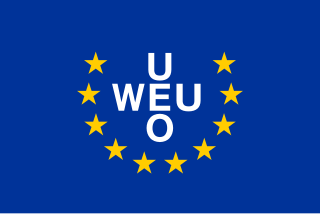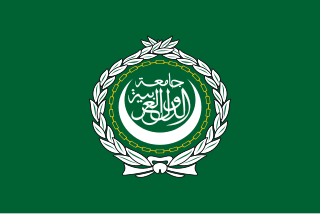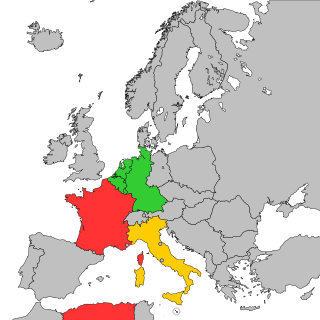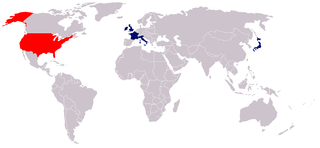
The Western European Union was the international organisation and military alliance that succeeded the Western Union (WU) after the 1954 amendment of the 1948 Treaty of Brussels. The WEU implemented the Modified Brussels Treaty. During the Cold War, the Western Bloc included the WEU member-states, plus the United States and Canada, as part of the North Atlantic Treaty Organization (NATO).

The Arab League, formally the League of Arab States, is a regional organization in the Arab world. The Arab League was formed in Cairo on 22 March 1945, initially with seven members: Egypt, Iraq, Transjordan, Lebanon, Saudi Arabia, Syria, and North Yemen. Currently, the League has 22 members.

The Common Foreign and Security Policy (CFSP) is the organised, agreed foreign policy of the European Union (EU) for mainly security and defence diplomacy and actions. CFSP deals only with a specific part of the EU's external relations, which domains include mainly Trade and Commercial Policy and other areas such as funding to third countries, etc. Decisions require unanimity among member states in the Council of the European Union, but once agreed, certain aspects can be further decided by qualified majority voting. Foreign policy is chaired and represented by the EU's High Representative, currently Josep Borrell.
The Five Principles of Peaceful Coexistence are the Chinese government's foreign relations principles first mentioned in the 1954 Sino-Indian Agreement. Also known as Panchsheel, these principles were subsequently adopted in a number of resolutions and statements, including the preamble to the Constitution of the People's Republic of China.

The Treaty establishing the European Defence Community, also known as the Treaty of Paris, is an unratified treaty signed on 27 May 1952 by the six 'inner' countries of European integration: the Benelux countries, France, Italy, and West Germany. The treaty would have created a European Defence Community (EDC), with a unified defence force acting as an autonomous European pillar within the North Atlantic Treaty Organization (NATO). The ratification process was completed in the Benelux countries and West Germany, but stranded after the treaty was rejected in the French National Assembly. Instead, the London and Paris Conferences provided for West Germany's accession to NATO and the Western European Union (WEU), the latter of which was a transformed version of the pre-existing Western Union. The historian Odd Arne Westad calls the plan "far too complex to work in practice".

The Little Entente was an alliance formed in 1920 and 1921 by Czechoslovakia, Romania and the Kingdom of Serbs, Croats and Slovenes with the purpose of common defense against Hungarian revisionism and the prospect of a Habsburg restoration in Austria or Hungary. France supported the alliance by signing treaties with each member country. The rapid growth of German power caused its collapse in 1938, and it never went into wartime operation.

The Common Security and Defence Policy (CSDP) is the European Union's (EU) course of action in the fields of defence and crisis management, and a main component of the EU's Common Foreign and Security Policy (CFSP).
The Arab League was formed in Cairo on 22 March 1945 with six members: Egypt, Iraq, Transjordan, Lebanon, Saudi Arabia, and Syria. Yemen joined on 5 May 1945. Since its formation the Arab League has promoted the Palestinian Arab cause in the Israeli–Palestinian conflict, including by imposing the Arab League boycott of Israel. The Arab League opposed the United Nations Partition Plan for Palestine in 1947. On 15 May 1948, the then seven Arab League members coordinated an invasion of what was by then the former British Mandate, marking the start of the 1948 Arab–Israeli War.
The United Arab Command (UAC) was a unified Arab military command established by unanimous resolution of the thirteen member states of the Arab League at the summit held in Cairo, Egypt, on 13–16 January 1964.
The Arab Organization for Industrialization (AOI) is an Egypt-based Arab military organization established in 1975 by Egypt, Saudi Arabia, United Arab Emirates and Qatar to supervise the collective development of the Arab defense industry. Following a gradual deterioration in relations between the AOI member-states, Egypt became sole owner of AOI in 1993. As well as meeting the requirements of the Egyptian military, AOI directs spare capacity to civilian programmes, including civilian transport and sanitation equipment; additionally, AOI has stated its intention of entering the wind power sector.

The Conference of Ambassadors of the Principal Allied and Associated Powers was an inter-allied organization of the Entente in the period following the end of World War I. Formed in Paris in January 1920 it became a successor of the Supreme War Council and was later on de facto incorporated into the League of Nations as one of its governing bodies. It became less active after the Locarno Treaties of 1925 and formally ceased to exist in 1931 or 1935.
The Arab League as an organization has no military force, like the United Nations or the European Union, but in the 2007 summit, the Leaders decided to reactivate their joint defense and establish a peacekeeping force to deploy in South Lebanon, Iraq, South Sudan, Federal Republic of Ethiopia and other hot spots.
European Union (EU) concepts, acronyms, and jargon are a terminology set that has developed as a form of shorthand, to quickly express a (formal) EU process, an (informal) institutional working practice, or an EU body, function or decision, and which is commonly understood among EU officials or external people who regularly deal with EU institutions.

The 14 July Revolution, also known as the 1958 Iraqi military coup, was a coup d'état that took place on 14 July 1958 in Iraq which resulted in the toppling of King Faisal II and the overthrow of the Hashemite-led Kingdom of Iraq. The Iraqi Republic established in its wake ended the Hashemite Arab Federation between Iraq and Jordan that had been established just six months earlier.

The 1964 Arab League summit in Alexandria was held on 11 September 1964 in Montaza Palace, Alexandria as the second Arab League Summit. The focus of the conference was to implement the plans discussed at the first Arab League summit held in January of that year. The summit was notable for being a key step in the buildup to the Six-Day War in 1967 and separately for "approving the establishment of the Palestine Liberation Organization."
The Council of the Arab League is the principal institution of the Arab League and was created by article 3 of the Charter of the Arab League.
The institutions of the Arab League are the permanent and non-permanent decision-making and advisory institutions created by the Charter of the Arab League and other agreements since the Arab League's establishment in 1945.

The Economic and Social Council of the Arab League is an institution of the Arab League that co-ordinates its economic integration. The ESC was established as the Economic Council under the terms of the Joint Defence and Economic Co-operation Treaty (1950). and held its first meeting in 1953. In 1957, the ESC established the Council of Arab Economic Unity (CAEU) and, in February 1997, the ESC adopted the Agreement to Facilitate and Develop Trade Among Arab Countries (1981) in pursuit of the Greater Arab Free Trade Area (GAFTA).

This article outlines the history of the Common Security and Defence Policy (CSDP) of the European Union (EU), a part of the Common Foreign and Security Policy (CFSP).

The European Union (EU) and the North Atlantic Treaty Organisation (NATO) are two main treaty-based Western organisations for cooperation between member states, both headquartered in Brussels, Belgium. Their natures are different and they operate in different spheres: NATO is a purely intergovernmental organisation functioning as a military alliance, which serves to implement article 5 of the North Atlantic Treaty on collective territorial defence. The EU on the other hand is a partly supranational and partly intergovernmental sui generis entity akin to a confederation that entails wider economic and political integration. Unlike NATO, the EU pursues a foreign policy in its own right—based on consensus, and member states have equipped it with tools in the field of defence and crisis management; the Common Security and Defence Policy (CSDP) structure.










